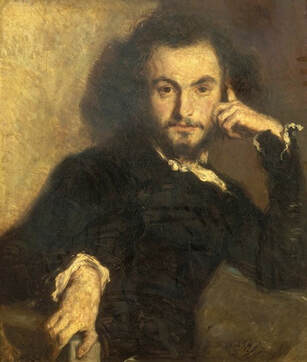|
Painting by Émile Isidore Deroy, 1820-1846, in the collection of the Palace of Versailles. This is a faithful photographic reproduction of a two-dimensional, public domain work of art. The work of art itself is in the public domain for the following reason: This work is in the public domain in its country of origin and other countries and areas where the copyright term is the author's life plus 100 years of fewer. Charles Baudelaire 1821-1867, French poet, essayist, and art critic. “Many of Baudelaire's philosophical proclamations were considered scandalous and intentionally provocative in his time. He wrote on a wide range of subjects and drew criticism and outrage from many quarters. Along with Poe, Baudelaire named the arch-reactionary Joseph de Maistre as his maître à penser and adopted increasingly aristocratic views.” “In his journals, he wrote, ‘There is no form of rational and assured government save an aristocracy. […] There are but three beings worthy of respect: the priest, the warrior, and the poet. To know, to kill, and to create. The rest of mankind may be taxed and drudged, they are born for the stable, that is to say, to practice what they call professions.’” He translated some of Edgar Allan Poe’s short stories. At boarding school in England, Poe learned French. Their master of thinking, and now mine: de Maistre. I am 13% French by way of Katherine Elizabeth Desrosier, whose ancestors probably came from the Rhône-Alpes region, southeastern France, coextensive with the historic region of Savoy. Desrosier translates “of the rose bushes”. The first “s” in the last name is silent. Now I know the sources of my misdirection and prickly nature, and they embolden me. Henceforth, my battle cry shall be, “Take no prisoners!”
0 Comments
Leave a Reply. |
Categories
All
Archives
July 2024
|

 RSS Feed
RSS Feed